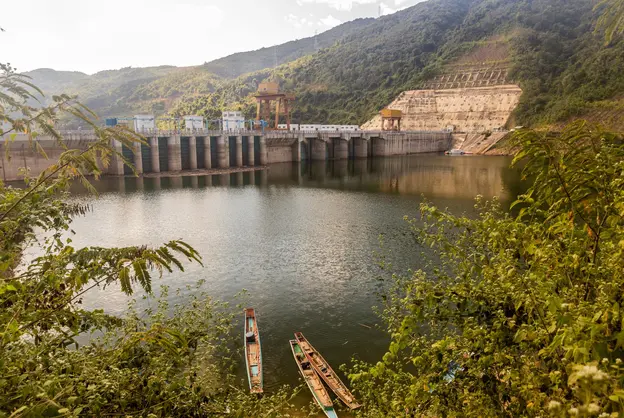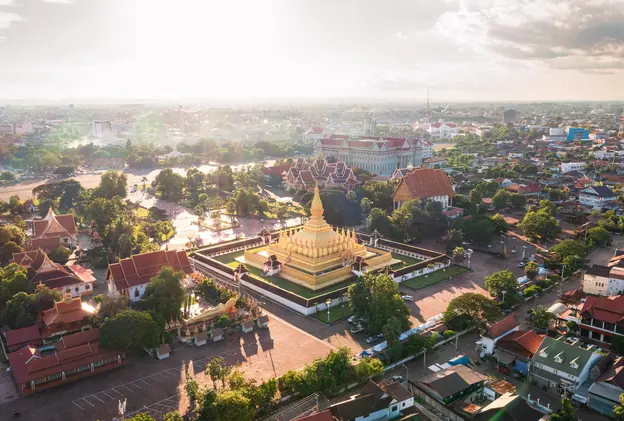Lao PDR Shows High-Level Political Support for Climate Action
The climate of Southeast Asia is undergoing significant changes. Scientists predict that rising temperatures in the region will lengthen dry seasons and make rainfall patterns more erratic. This is expected to lead to more severe and frequent storms, droughts and flooding.
These changes pose significant challenges for Lao PDR, a country with an economy heavily dependent on natural resources. Key resources, such as rain-fed rice and hydropower, are highly susceptible to climate variability. The northern and northwestern areas face drought risks, while the central and southern plains along the Mekong River are prone to flooding. This shifting climate scenario poses a substantial risk to the livelihoods and living conditions of the Lao people, requiring urgent and effective adaptation and mitigation measures to safeguard national development.
Recognizing the need for action, Lao PDR was the first Asian country to submit its intended Nationally Determined Contribution (NDC) in September 2015, followed by a more ambitious updated NDC in May 2021. In its 2021 NDC, Lao PDR set an unconditional emissions reduction target of 60% by 2030 compared to a 2020 baseline scenario and conditional targets covering land use, agriculture, waste and energy. These targets are stepping stones toward a long-term ambition to achieve carbon neutrality by 2050. The 2021 NDC also establishes long-term adaptation goals based on measures such as resilient farming systems, nature-based urban development and more robust hydropower regulations and safety.
Strong Political Support and Whole-of-Government, Whole-Of-Society Climate Action
Recently, Lao PDR launched its NDC Implementation Plan, a 5-year roadmap to accelerate climate action in the country. Developed with technical support from the Global Green Growth Institute (GGGI) and funding from the Partnership Action Fund (PAF), the Implementation Plan marks a key step in translating ambitious climate goals into actionable steps with high-level political backing.
The Office of the Prime Minister is responsible for overall NDC monitoring, alignment with national development planning and mobilizing international and domestic resources. While challenges related to financing, technical expertise and public awareness are a reality in the country, the Implementation Plan — and the high-level support behind it — is an important step in coordinating action and channeling human and financial resources to national priorities.
Lao PDR is also focused on aligning climate action with national development. The government has also issued several climate laws and regulations, such as the 2019 Decree on Climate Change and the National Climate Change Strategy 2030. The Implementation Plan draws on these climate documents while aligning with existing national development plans, including the National Socioeconomic Development Plan and the National Green Growth Strategy.
To facilitate policy alignment and coordination across ministries, the government designated the Department of Climate Change (DCC) within the Ministry of Natural Resources and Environment (MoNRE) to be the national focal point for coordinating NDC implementation across sectoral ministries. Within the DCC, the Technical Working Group on Climate Change (TWGCC) brings together expertise from multiple ministries, research institutions and non-governmental organizations to advance NDC implementation tracking and data collection and analyses.
Priority Actions Across Sectors
The NDC Implementation Plan focuses on addressing climate change through mitigation and adaptation strategies across multiple sectors, including agriculture, forestry and other land use (AFOLU), energy, waste, transportation, urban development and public health, with a focus on water quality and systems.
The mitigation action plan for the AFOLU sector aims to increase forest cover to 70% of land area, compared to 62% coverage currently, while improving forest conservation, sustainable management practices and establishing buffer zones around national park and nature preserves. While many AFLO priority projects are on track, they require close monitoring. The government aims to improve monitoring, reporting and verification (MRV) of existing AFOLU projects, particularly in rice patties, where ongoing work has the potential to reduce methane emissions.
In the transport sector, the Implementation Plan covers several unconditional targets, including a new bus rapid transit system in Vientiane, wider access to public transit and increased ridership. Since 2009, the number of private registered vehicles has increased by more than 10% in Vientiane annually. The country also aims to expand its charging infrastructure, powered by clean energy, to deepen the penetration of electric vehicles. The country has set a conditional target of 30% penetration for two-wheeled vehicles and passenger cars.

Within the energy sector, the Implementation Plan focuses on regional cooperation for renewable energy exports and tapping new sources of solar, wind, biomass and hydropower energy. Hydropower development over the past 10 years has contributed significantly to emissions reductions. As of 2018, Lao PDR had 4.5 gigawatts (GW) of installed capacity, with 8.5 additional MW expected by 2030.
Through its waste sector initiatives, the country aims to expand waste collection coverage, increase investments in waste-to-energy projects and expand organic waste recycling. The country set a quota of 500 tons per day for the capital city, home to nearly 850,000 residents. Waste emissions reductions are currently on track to meet NDC targets.
The adaptation component of the Implementation Plan also spans multiple sectors. In the AFOLU sector, Lao PDR aims to introduce more resilient farming systems and integrated land use and natural resources planning, enabled by stronger domestic technical capabilities.
Priority national public health efforts focus on water aim to establish a national water resources inventory to establish baseline conditions for the quality and availability of water resources and identify areas vulnerable to floods or scarcity. Lao PDR also intends to strengthen water supply and point-of-use protections through the “Scaling-up Water Supply, Sanitation and Hygiene” project led by the Ministry of Public Works and Transport and the Ministry of Health and financed by the World Bank. The project will reach 192,000 residents.
In transport and urban development, the Implementation Plan proposes urban adaptation financing innovations and a focus on green infrastructure and nature-based urban solutions across cities. Located right on the Mekong, Vientiane has experienced significant flood events that can be mitigated through the development of “sponge cities.”

In the energy sector, resilience-building centres on improving the regulatory environment for dam safety — particularly important given the significant potential for hydropower build-out in the country.
Lao PDR and Longstanding NDC Partnership Support
The NDC Partnership has worked closely with Lao PDR since the country became a member in 2019. The Partnership has supported Lao PDR with green transition strategies, strengthening MRV systems, capacity building and the development of a Long-Term Low Emissions Development Strategy (LT-LEDS) and the NDC Implementation Plan.
According to GGGI, the support from the NDC Partnership through the PAF has significantly enhanced Lao PDR’s commitment to the Paris Agreement. As a key delivery partner, GGGI has used this support to provide technical assistance to the Government of Lao PDR, assessing the country's climate change readiness in the public works and transport sector and building the technical capacity of government officials in modelling greenhouse gas emission projections.
By setting clear targets for emissions reductions and resilience building, the NDC Implementation Plan is a testament to a strong national commitment to tackling climate change head-on through coordinated sectoral action.
The NDC Partnership continues to support Lao PDR in implementing its current NDC commitments through targeted, country-driven support.
Partnership Support Available to Countries
The recently launched NDC 3.0 Navigator is now also available for countries such as Lao PDR to help guide NDC updates and enhancements. The interactive online platform helps developing nations explore nationally relevant approaches to preparing ambitious NDCs, raising ambition and addressing implementation and financing needs for stronger 2025 submissions.
The Navigator also equips countries to scope and prepare high-quality, comprehensive requests for NDC and LT-LEDS support through the NDC Partnership’s Global Call for NDCs 3.0 & LT-LEDS.
